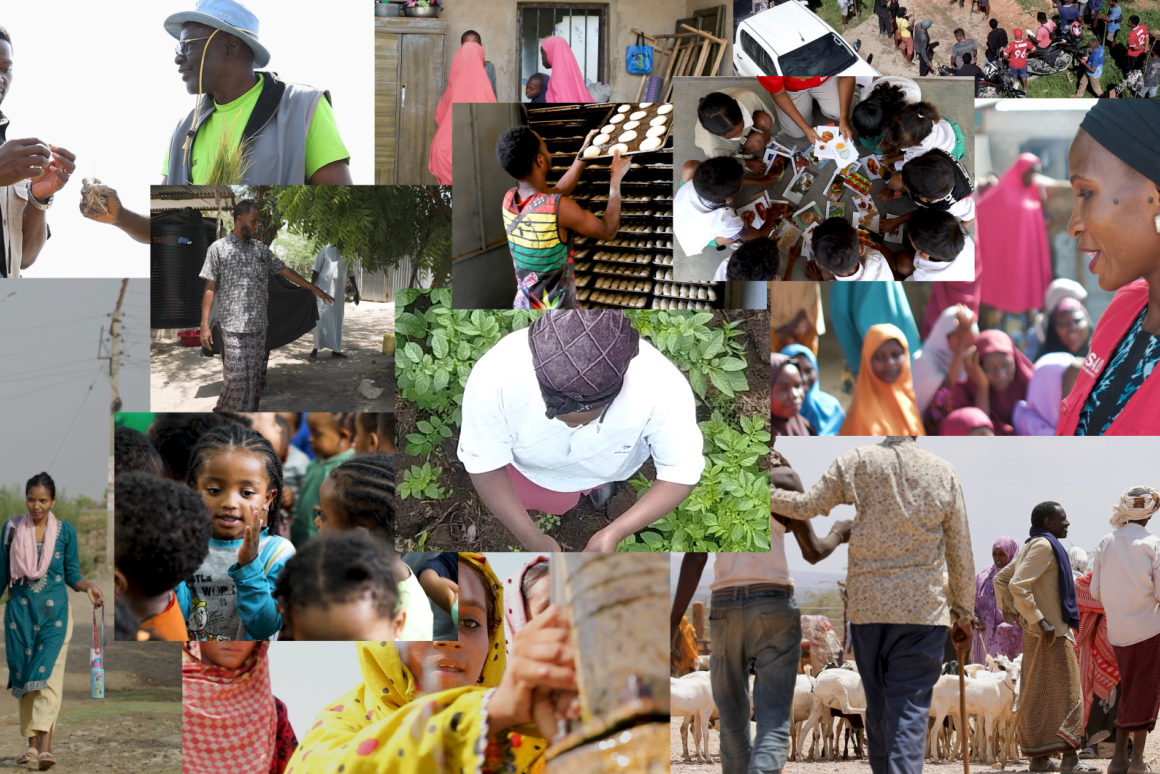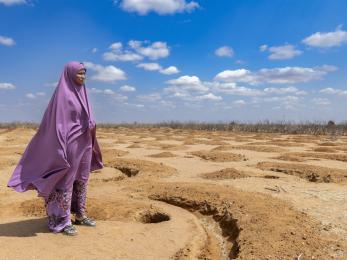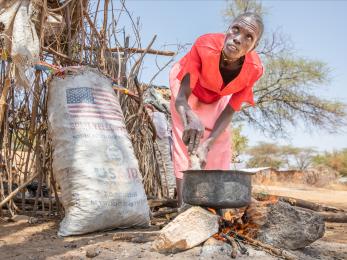How communities are adapting—and thriving—in a changing climate
Mercy Corps’ Climate: Possible campaign sparks bold climate solutions
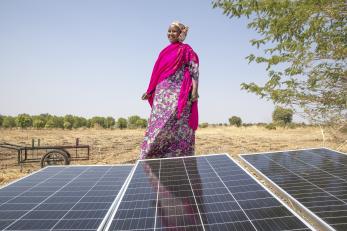
Across the world, those least responsible for the climate crisis are suffering its worst impacts. Extreme heat, drought, flooding, and shifting rainfall are devastating communities, destroying infrastructure, threatening lives and livelihoods, and forcing millions to leave their homes in search of safety and opportunity. As the crisis grows, short-term relief isn’t enough—we must partner with communities to build lasting resilience.
In 2023, Mercy Corps launched Climate: Possible, an ambitious campaign to support communities bearing the brunt of the climate crisis. Since then, we’ve reached 11.2 million people with our programs promoting climate-smart solutions for a more resilient future.
Climate: Possible’s programs are accelerating and expanding proven climate adaptation solutions while also testing and scaling new, innovative ideas. Learn more about how we’re putting climate resilience in action and supporting communities to prepare early, strengthen sustainable agriculture, expand clean energy access, and lead the way with groundbreaking local start-ups.
Preparing ahead for climate emergencies
Climate-related crises continue to escalate in intensity and scale. Yet, more than half of all humanitarian crises are predictable, and 20% are highly predictable. Anticipatory action—delivering resources and support before disaster strikes—is seven times more cost-effective than traditional humanitarian aid.
Our anticipatory action approach, which includes weaving climate adaptations into local development plans, ensures communities have access to the resources they need to protect themselves before disaster strikes.
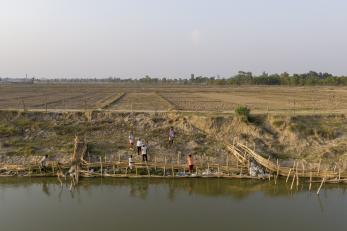
In Badabaika, Nepal, where massive floods in 2008 displaced more than half the community and caused severe soil erosion, we helped establish a committee to lead resilience efforts.
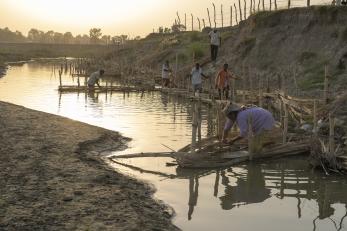
Residents built bamboo spurs to divert river flow, protecting their village from further erosion and recurring flooding. Women have taken the lead in maintaining the spurs, planting kans grasses, also known as wild sugarcane, along the river, and raising funds for their community’s emergency management.
Restoring rangelands for long-term resilience
Smallholder farmers produce one-third of the world’s food and will play a pivotal role in ensuring sustainable, equitable global food security in the face of climate change—ensuring families around the world have enough to eat. As the climate crisis intensifies and food becomes more difficult to grow, farmers can’t change the weather, but they can change how they prepare for and respond to it.
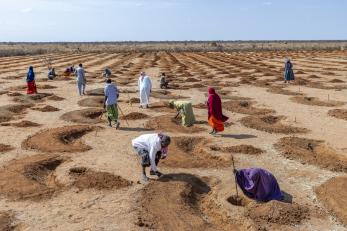
Last year, through our regenerative agriculture approaches, Mercy Corps connected over 5.7 million farmers and pastoralists to the skills, knowledge, and resources needed to increase their production, feed their families, and boost their livelihood opportunities and incomes by reclaiming barren rangeland.
In Kenya's arid regions, extreme weather, including longer droughts and more intense floods, threaten land fertility, water supply, and economic stability. Mercy Corps collaborated with pastoralists and county governments to set up sustainable rangeland management. Through geographical analysis and climate services, like real-time weather warnings, restored land will help communities to withstand long droughts. In Garissa County, we partnered with the county livestock department to restore 500 acres of land, impacting over 41,000 people.
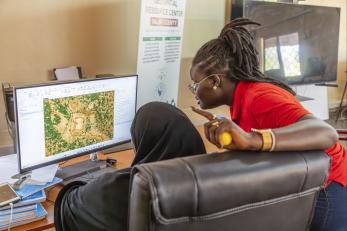
We are now testing approaches and incentives to support female pastoralists, who are often excluded from decision-making and land ownership. Through our partnerships, we are co-creating rangeland management solutions with communities that both restore and improve rangelands while also supporting sustainable livelihoods and shared use among different groups. The program uses soil engineering techniques and cultivates indigenous trees to enhance climate resilience and ecosystem health. Results from the current test phase will determine the best approach to scale natural resource management beyond the 50 pilot communities.
Driving universal access to renewable energy
Today, 860 million people lack access to reliable electricity—an essential requirement for overcoming poverty and adapting to climate change. This problem is most severe in communities and countries with the least access to reliable electricity. Mercy Corps has nearly two decades of experience designing and implementing renewable energy products and services, while also creating green jobs that support a sustainable energy future.
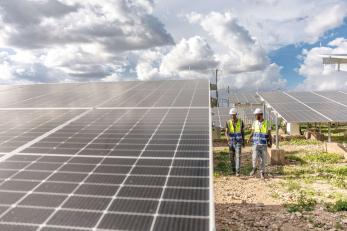
More than 90% of the 120 million refugees and displaced people around the world—many forced to live in makeshift camps far away from established cities or existing infrastructure—lack access to modern energy services, severely impacting household health, education, and ability to earn an income. Residents at refugee camps rely on limited energy sources powered by diesel generators, which are costly to operate, inconsistent, only last two to three hours a day, and emit pollutants.
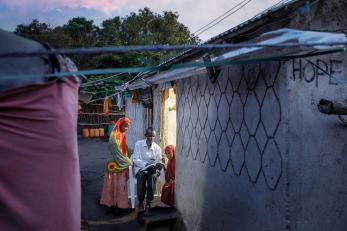
Mercy Corps’ Enter Energy initiative is piloting an innovative public-private partnership model to provide access to sustainable energy. With reliable electricity, displaced communities have dependable access to communication networks; increase income through small businesses that rely on electric appliances like refrigerators; and improve community safety with lighting at nightfall. In Ethiopia, we helped establish a private utility company, Humanitarian Energy, to deliver the country’s first private solar-powered mini-grid to the refugee and host communities in Sheder Refugee Camp.
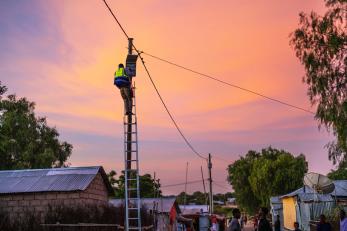
In Sheder Refugee Camp, we are supplying electricity to over 1,000 households and businesses, including a hospital that previously relied on a diesel generator for life-saving equipment. With our support, the hospital plans to increase its services and acquire more equipment. Humanitarian Energy is also expanding to three more sites in Ethiopia to increase access to solar power to over 200,000 people and demonstrate a global model for reducing emissions in the humanitarian sector.
Partnering with locally led, early-stage startups
Through our impact investment team, Mercy Corps Ventures, we are supporting early stage, locally led startups that develop innovative, scalable solutions for communities most vulnerable to climate change. This approach focuses on addressing critical climate-related challenges such as extreme weather, resource scarcity, and financial instability in emerging markets.
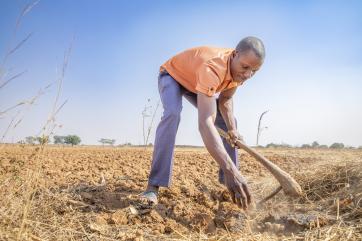
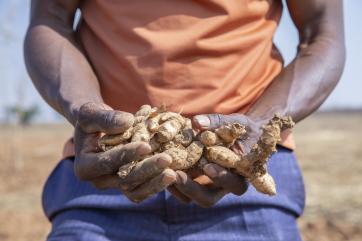
Through Mercy Corps Ventures’ first round of funding, we have catalyzed over $500 million in climate finance, serving 37 million people with a portfolio made up of 45% women founders. One of the eight companies we invested in last year, Seabex, helps smallholder farmers save water and grow more crops through smarter irrigation. Its platform works with existing irrigation systems—avoiding costly new hardware—and uses satellite data, climate records, crop data from major agricultural companies, and AI models to provide adaptive irrigation advice that boosts yields and strengthens resilience to climate change.
Building lasting change for all communities
Delivering solutions to help communities around the world cope, adapt, and ultimately thrive in the face of a rapidly changing climate will require unprecedented commitment, creativity, and collaboration. With your support, Mercy Corps continues to help communities move farther and faster toward lasting climate resilience. Learn about Climate: Possible’s 2024 impact here.

